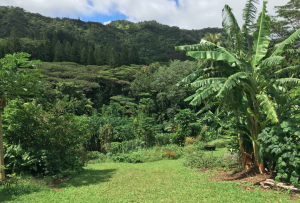Visiting Kokua Kalihi Valley (KKV) Comprehensive Family Services really changed how I think about the role of a health center in supporting the needs of the community.
The KKV clinic is a very special place. I have had the pleasure of knowing its executive director, David Derauf, for a few years and was familiar with KKV’s leadership in addressing social determinants of health. However, I didn’t really comprehend what it meant for a health care organization to really understand and respond to the needs of its community until I visited.
KKV has deep roots in Honolulu. Founded in 1972, KKV didn’t get its start as a health center, but as a non-profit organization with a staff of four outreach workers, following the motto, “Neighbors being neighborly to neighbors.” This very small team, who began connecting the valley’s low-income residents in need with existing services, has since grown to a staff of more than 200 people that reaches 10,000 community members. But despite that incredible growth, KKV has held onto its power to connect and listen to its community, as well as a humility and desire to provide the community accessible and appropriate health care services.
Central to KKV’s approach is its Roots program, which focuses on the power of food. Food connects people to the land, their culture, the community, and family. The program has three key components:
First, Kahili Valley residents have built a community garden on the Ho’oulu Aina Nature Preserve in the back of the Kalihi Valley. It’s not your typical community garden. It sits on 100 acres of a lush nature preserve, and they have carved out a portion of it for only growing organic fruits and vegetables. The land is amazing. They have also incorporated woodworking opportunities for young men to build canoes and surfboards. This is just one of the ways the community is finding creative solutions to engage men and youth, typically the hardest-to-reach segments of the population when it comes to managing health, and provide them with powerful outlets to create, connect, and have purpose.

Second, they come together to harvest and prepare the food as a group. KKV and the Kahili Valley community have created cooking clubs and competitions for youth to get excited about preparing their own meals. They are helping people learn how to cook and create delicious masterpieces using the amazing fruits and vegetables of the region – some of which I had never seen before on the mainland.
Third, KKV and its community members share the abundance of food, both by providing the fruits and vegetables to those who have worked on the farms, as well as to others in the community. They also sell some of the produce at farmers markets to support the Roots program, and they have created a Roots Cafe in the KKV clinic, so staff and community members can enjoy the homegrown food and connect in new ways.
KKV plays a critical role in its community, as a convener and organizer, as a fundraiser and connector to resources and people, as a leader and trusted entity, and most importantly, as a listener and partner in investing in strengthening the community. KKV is focused on changing the narrative of the community: although many of the community members are poor and have many struggles, they are powerful people with amazing stories. They have been able to create amazing things when given the support, tools, and resources to do so.
There are many more stories to share from KKV, but I will have to tell you those in the future. I’m curious: Do you have stories of partners coming together to change the narrative around health?

